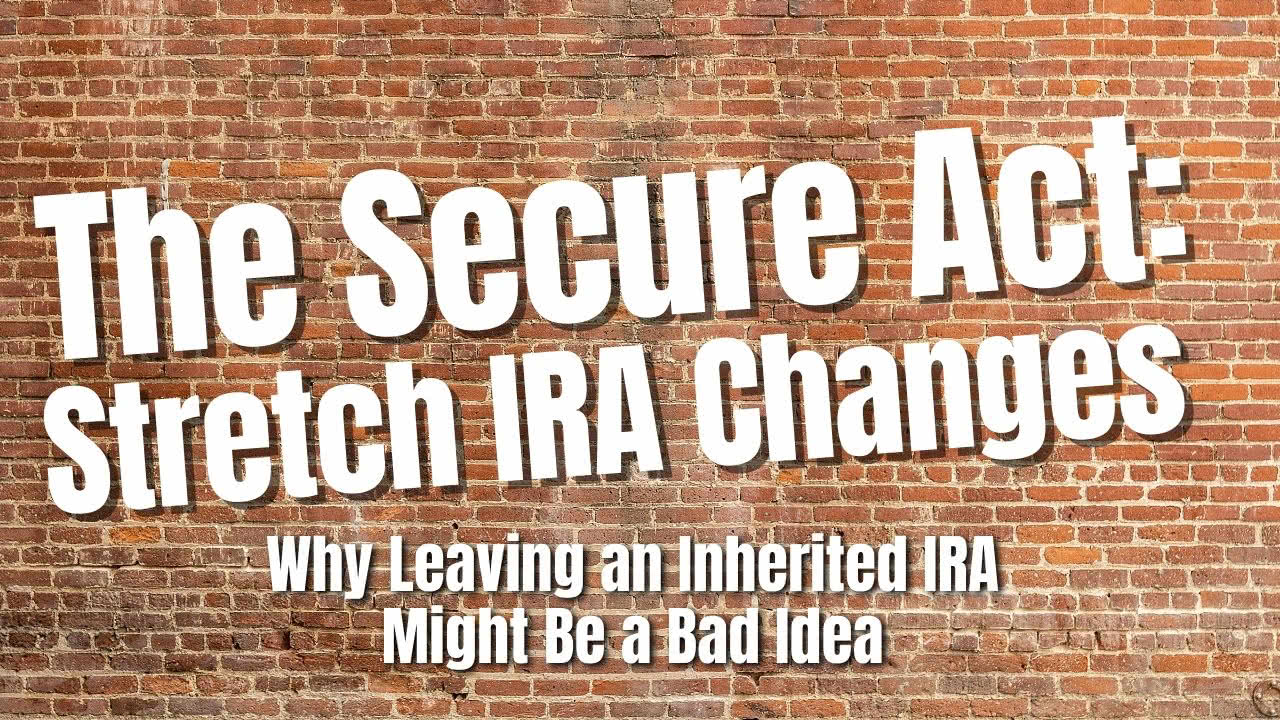
The Secure Act: Important Changes to Your IRA that You Need to Know
If you’re planning to leave an inheritance to your children, there’s a new rule in the Secure Act that will probably cause your kids to pay more taxes if you pass on your retirement plan.
Today, we’re discussing how the Secure Act, passed in 2019, affects your retirement plans and may front-load taxes to kids who inherit these plans.
If you want to know what the Secure Act is, how it applies to you, and what you can do about it… tune in below!
Podcast: Play in new window | Download (Duration: 29:45 — 34.1MB)
Subscribe: Apple Podcasts | Spotify | Android | Pandora | RSS | More
Table of contents
If you have an IRA, the following changes to the tax laws are important for you to know. These changes can affect how your inheritance is distributed from an IRA, making it prudent to reassess your financial strategy. We want to help you continue to maximize your retirement and still leave an inheritance, should you choose. Staying on top of the changes and making some smart pivots can save you and your family on heavy tax penalties down the road.
We have designed this article as an overview of the changes so that you can meet with your CPA and financial advisors with confidence. It’s always crucial to be informed, yet work with a professional on the specifics.
The Key Takeaways of the Secure Act
Before we can dive too deep into the impact of these changes, and what you can do differently, it’s important to look at what those changes are.
Contributions
Previously, you could make contributions to your traditional IRA until age 70 ½. Now, you can make those contributions indefinitely. This also means that you don’t have to take your required minimum distributions (RMDs) until age 72. The implications could be an increase in taxes, for two reasons:
- Your account has more time to grow. While growth is good, this also raises your tax liability.
- That two-year window (or more) gives room for tax brackets to change, and it’s more likely that taxes will increase than decrease. So if you’re taking a higher distribution, and the taxes increase, the tax hit could feel even greater.
Part-time Workers Get 401(k) Options
In the past, part-time workers were not eligible for 401(k) plans. Now, the Secure Act has created a provision for long-term part-timers to make contributions to a 401(k). This broadens the scope of who is eligible for government-sponsored retirement plans, which could entice more people to participate.
Those who are eligible? Anyone who works 1,000 hours in a year, or who has worked 500 hours a year for three consecutive years.
Tax Breaks
The Secure Act also rolled in some tax breaks, many specifically for businesses. One of the bigger breaks is for businesses who set up automatic enrollments for employees. This means that rather than opting into a 401(k) plan, employees may have to opt-out.
Parental Aid
Along with other changes, a provision was added that will allow parents to withdraw $5,000 without penalties, to help cover birth and adoption fees. This can help offset some of the typical costs of new parenthood.
This is significant, because in the past any withdrawals from a qualified plan before a certain age would incur a penalty. Similarly, parents will now be able to withdraw up to $10,000 annually without penalty from a 529 plan to repay student loans.
The Secure Act and IRAs
One of the reasons provided for the change in required minimum distributions, is that people are living longer. Often, people are working longer, too. On one hand, this allows the money more time to grow, and helps it go farther in retirement. On the other hand, it also raises questions about the tax implications in the long-run.
We think one of the most prudent questions to ask yourself is: “If I’m not paying this tax on my income today, what will that tax implication be in the future?” Because unfortunately, tax-deferment isn’t a free pass. While there are some strategies in which a deferral makes sense, there are other factors to consider, such as:
- Will your income increase over time?
- Will taxes increase over time?
- Can you afford to live your current lifestyle on the interest of your IRA or 401(k)?
- How much do you want to leave to your heirs? (And how much will be taxed?)
How the Secure Act Impacts Inheritance

With an inherited IRA, we can see one of the biggest changes. In the past, a non-spousal inheritance of an IRA could be taken in small distributions over the beneficiary’s lifetime. This was referred to as a stretch IRA. Now, that inheritance must be taken in full over 10 years. According to Investopedia, this will create an additional $15.7 billion of tax revenue for the government.
Our understanding is that you can either take these distributions incrementally over ten years, or in a lump sum at the beginning or end of the 10-year window. However, this is taxed as ordinary income. So regardless of how you take these distributions, there’s a possibility that that income is taxed in a higher bracket.
What we don’t know is how those brackets will change. Because not only can the percentage change, the margins of the brackets can change as well. This means that a well-intentioned inheritance can be less impactful than you intend it to be.
Maximize Your Inheritance
When leaving an inheritance, we all want it to be as substantial as possible. When it’s undercut by taxes and fees, the impact we intend to make might not be possible. The Infinite Banking Concept with whole life insurance is one way to pass on a tax-free inheritance and ensure that your intentions are carried out.
This type of strategy gives you the freedom to spend and save more, while still leaving your children with a brighter future. And it works well with other assets and retirement accounts. Take control of your finances today and live a more empowered life with both freedom of time and money.
Book A Strategy Call
Do you want to coordinate your finances so that everything works together to improve your life today, accelerate time and money freedom, and leave the greatest legacy? We can help!
Book an Introductory Call with our team today https://themoneyadvantage.com/calendar/, and find out how Privatized Banking, alternative investments, or cash flow strategies can help you accomplish your goals better and faster.
That being said, if you want to find out more about how Privatized Banking gives you the most safety, liquidity, and growth … plus boosts your investment returns, and guarantees a legacy, go to https://privatizedbankingsecrets.com/freeguide to learn more.
Becoming Your Own Banker, Part 27: 7 Money Myths that are Costing You, Continued
Is what you think about money actually true? Is it helping or hurting you? Moving you forward and expanding your influence, or limiting you and your potential? If you joined us last week, you know that in true Bruce and Rachel fashion, we only covered half of our intended conversation, so we’re back to reveal…
Read MoreSurviving the Storm: Navigating War in Israel with Rabbi Lapin
When war across the world could mean war close to home or a whole world war … when conflicts thousands of years old can’t be solved overnight … when truth seems defined by who’s in power … when totalitarianism seems stronger than freedom and free markets … when open borders looked like compassion but instead…
Read More


